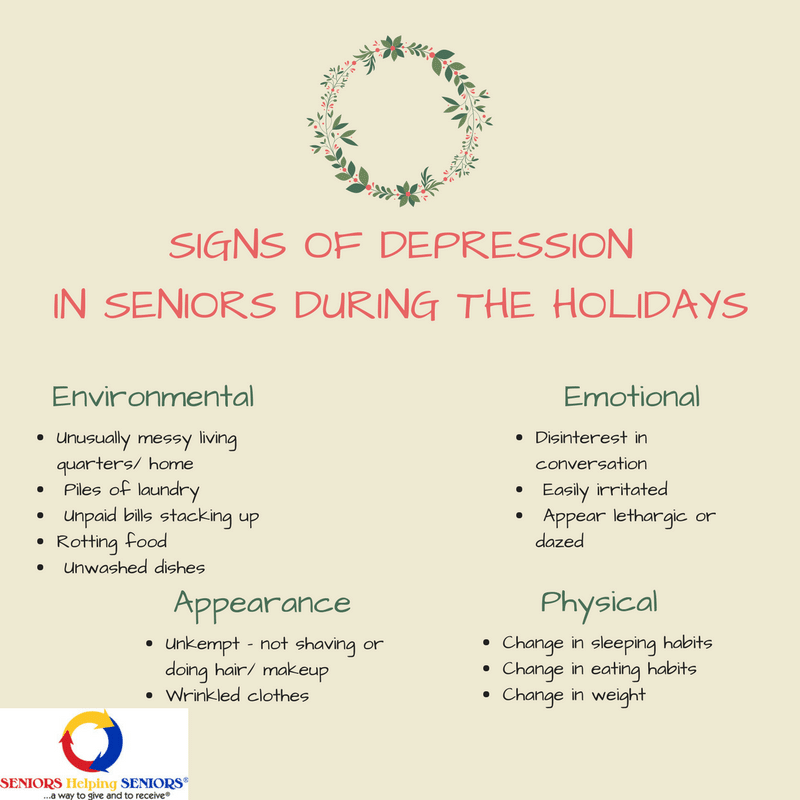Over the river and through the woods used to be such a great place to be during the holidays. The smell of cookies and ham, the festive decorations, and all those presents under the tree meant the holidays had truly started for our family. But as time went by, I grew up. And coming home for the holidays inevitably meant I would encounter change. The holidays were great, but my grandmother no longer “owned” the holiday. She wasn’t cornering the family holiday market with her treats and festive spirit like yester year. The holiday became about including her in our new traditions. For me, it was sad, but it wasn’t devastating. I cannot speak for grandma. But, coming from a family of mental health counselors, we made sure grandma was always by our side. According to the National Alliance on Mental Illness, 6.5. million Americans 65 years old and older suffer from some level of depression. Our family wanted to make sure that grandma wasn’t a statistic. During this holiday season, I ask that you do the same. Your favorite senior citizen could be suffering silently, so be extra vigilant and take gentle care to make sure they smile this holiday season.
In order to make people smile, you must first understand why they aren’t. In seniors, many times the holidays bring up memories of lost loved ones. Additionally, not being as “spry” as they once were means they cannot do everything they used to. The holidays are physical and, from putting up the tree to crawling around the floor wrapping presents, we take this for granted. Even making cookies can be a struggle. In a person’s twilight years, they are more likely to live alone as well. This can lead to isolation. Isolation, believe it or not, can increase a senior’s risk for health conditions like dementia and heart disease. And there is the opposite side of the coin. What if your favorite senior has moved into a nursing home, or a relative’s house? Well, it likely means their most precious holiday possessions are no longer at arms reach. The special ornaments won’t get hung and eating from the Christmas Spode might not happen. And the most common of all holiday bummers – a fixed income. Most seniors don’t have the cash flow they once did. Not being able to spend money on special goodies and presents like they once did can be just downright disappointing for them.

Signs of Depression in Your Aging Loved One
PHYSICAL
- Change in sleeping habits
- Change in eating habits
- Change in weight
APPEARANCE
- Unkempt – not shaving or doing hair/ makeup
- Wrinkled clothes
EMOTIONAL
- Disinterest in conversation
- Easily irritated
- Appear lethargic or dazed
ENVIORNMENTAL SIGNS
- Unusually messy living quarters/ home
- Piles of laundry
- Unpaid bills stacking up
- Rotting food
- Unwashed dishes
Notice any of this? Here’s what you can do to make a difference, and maybe, just maybe, bring a smile to your favorite senior’s face. Just be there! A simple visit can do wonders to the spirit. Invite them to join in on your holiday plans. They may not have a single one. Bring by a favorite holiday confection or spend a little time helping them make one. And, for goodness sake, please avoid “heavy talk” during the holidays. If they begin to get teary eyed about a memory turn the conversation around. Change the subject. Focus on the positive. Lastly, if you notice signs and symptoms of depression in your favorite senior this holiday season, share your concerns with their family members after the festivities have wrapped up. Make sure to bring a list of observations to the conversation because this will help to clarify your concerns.
I still have vivid memories of my grandmother’s nursing home apartment. It was small but it had an oven. And every year, my sister and I would make a point to go and bake with her. Unable to stand because of balance issues, my grandmother would “manage” the process from her white card table in the corner. The time was precious (and tasty) and it got all of us in the holiday spirit.


